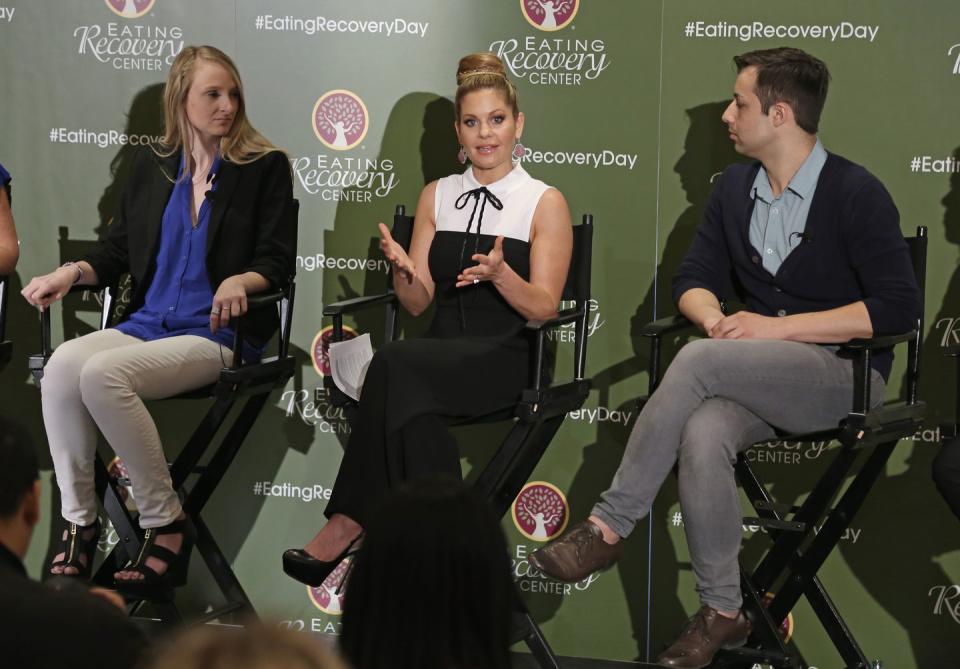Candace Cameron Bure Reveals Tragic Details About Her Battle With Bulimia, Calling It A "Destructive Relationship"

As Danny Tanner's oldest daughter on Full House, Candace Cameron Bure grew up in front of the camera. It'd be easy to assume, then, that the pressures of the spotlight (and the public scrutiny that often comes with it) can lead to an unhealthy relationship with food, but Cameron Bure is quick to note that's not the case. For her, the struggle began after the show's final credits ran.
"My parents were wonderful and protective of not allowing the entertainment industry shape me into what they believed the standards of body image or perfection should be," she says. "I didn't have any sense of my body, that it wasn't good enough, while I was growing up on television."
Things changed when Cameron Bure moved to Montreal. She was 20 years old and had just married her husband, professional hockey player Valeri Bure, moving away from her family and friends, and leaving her acting career behind to focus on being a wife and supportive spouse. The transition proved much more difficult than she expected, especially when she realized her husband would be away for 41 out of 82 games of the year.
"I sat lonely, so many nights, not knowing what to do with myself, but there was always one friend that was always there for me, that was always readily available, any time I wanted it, and that, for me, was food," she says. "While I would comfort myself with food, it became a very destructive relationship, and it was one that really caught me off-guard."

Food wasn't the real issue she struggled with.
Cameron Bure's struggle underscores one of the biggest myths about eating disorders, according to the Eating Recovery Center: "It's all about food." For Cameron Bure, the battle wasn't so much about what she was eating, but about her fight to reshape her identity.
"I really lost the sense of who I was, because I placed so much value on who I was as a friend, and a daughter, and as an actress-I had worked for so many years-and I couldn't find my place," she explains.
She soon found herself trapped in a cycle of binging on food, then feeling such guilt and shame about how much she'd eaten that she'd throw it up later.
"It took over to a point where you just feel such a loss of control, and yet, the very thing you're trying to do is control," she says. "It was such a lie that food was giving me comfort and value."
Cameron Bure shared her story as part of the Eating Recovery Center's inaugural Eating Recovery Day, an event designed to raise awareness about eating disorders-which affects 30 million people and has the highest mortality rate of any mental illness, according to the center-and show that recovery is possible, no matter how dire things may seem.
Cameron Bure hid her struggle with bulimia from everyone, including her husband, until one day, her father caught her.
"It was one of the most self-shaming experiences I've ever had, and not from the person who caught me," she says. "I was so saddened to see the tears streaming down my dad's face, that he was so sad for me, and I didn't want to disappoint him or my mom."
She vowed to change her ways, and for a while, she completely stopped binging and purging food. But then, one day, an urge overwhelmed her, and she found herself locked in the cycle worse than ever before.
"It felt like being on a runaway train, and it's not like you can just jump off any time you feel like," she explains. "It traps you. It can trap you physically, but it at first traps your mind, into a mindset that's not healthy. It's not as easy as saying, 'just eat.' If it were that easy, no one would struggle with it."

This conversation changed everything.
At that point, Cameron Bure realized she couldn't do this on her own, so she spoke to her pastor about her issues with bulimia, who introduced her to a family friend who had recovered from an eating disorder herself.
"I was so relieved to talk to someone who had experienced what I was going through, because I'd never talked about it with anyone," she says. "Even with my husband, while I told him and he was understanding of it, he couldn't relate to it. So when I had someone who could relate to it, I felt such a sense of relief."
Those conversations led to a spiritual awakening, Cameron Bure says, that helped her rebuild her identity-rooted in a faith in God over what she did for a living-and finally stop binging and purging. That doesn't mean she won't struggle with urges in the future, which she's quick to acknowledge.
"I hate to think that I'll have to think about it for the rest of my life, but I just, I will, and it's okay. It's okay, and there's nothing to be ashamed of for that, or if slip-ups happen, it's okay. You can always get back on track. It's never too late," Cameron Bure explains.
Thank you Vancouver for the blue sky today. #AuroraTeagarden #JuliusHouse
A post shared by Candace Cameron Bure (@candacecbure) on Apr 20, 2016 at 12:35pm PDT
Now 40, it's been years since Cameron Bure last purged-she says she struggled through her early twenties-and the thing that's helped keep her from relapsing, beyond her faith and the support of her family, is the mental shift that occurred. The first time she tried to stop, she did so to please her parents. The second time, it was for her.
"I'm glad that my dad had talked to me, because if it weren't for him in the first place, I may not have admitted the truth," she explains. "Even though it took me several years later to admit it for myself, it was the first step in recognizing that there was a problem."
Now that Cameron Bure's a parent herself, she tries to teach her kids about heart health more than anything else.
"It's not about the way we look or our body image, but you have to keep yourself healthy, and that's eating good, healthy foods and getting proper exercise," Cameron Bure says. "[My daughter] embraces all of her curves in a way I wish I could have when I was her age. She's so proud of her body, and I'm so grateful for it."

Cameron Bure first discussed her battle with bulimia in her 2011 book, Reshaping It All, and since then, she's received several questions from people on social media, all asking what they can do or where they can go for help. The biggest thing, she says, is finding a source of support.
"Tell someone," she says. "If you don't feel you have a trusted person to tell, that's where the Eating Recovery Center comes in. ... It's been a journey; it's been an emotional one, but it's good to know you're not the only one, and that recovery is possible."
If you or someone you know needs help, visit the National Eating Disorders Association (NEDA) website or contact the NEDA Information and Referral Helpline at 1-800-931-2237.
Follow Delish on Instagram.
('You Might Also Like',)

